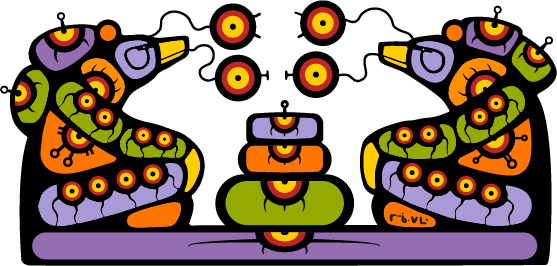pîkiskwêwin graphic designer, Dallas Montpetit and Language Memories
As an Indigenous graphic designer, I’ve been honoured to work as part of the pîkiskwêwin team. This project has allowed me to not only grow my talents as a designer but also to further explore my Métis heritage by watching the Michif language podcasts with my grandmother Elizabeth Poitras.
Together, we’ve really enjoyed watching “Mawmaw Sachweezin: Mom’s Kitchen Métis Cooking Show,” because it’s the same dialect of Michif my grandmother grew up with: Heritage Michif.
Watching those videos has brought tears to her eyes. I learned last week from one of pîkiskwêwin’s podcast hosts, Charlotte Ross, that my grandma is what is known as a “silent speaker.” This is someone who was raised in an environment where family members and friends spoke the language butwas never explicitly taught it. Although the generation Elizabeth’s parents belonged to were fluent in Michif, they never passed the language down to her because they were not allowed to speak their language.
As we watched the first video together, right away she recognized words, phrases and intonation being used. She said it was just like how her family spoke the language, with lots of joking and laughter involved.
Hearing Alex and Beatrice Pelletier using the language brought her back to those childhood memories growing up in Lebret. All of the get-togethers, all of the humour, listening to Don Messer fiddle music (she said EVERYONE had a record of Don Messer!), jigging and polka dancing. Her family and friends would take turns gathering at different people’s homes and would just start singing and dancing and playing songs all night long. People would visit and play their fiddles, and if you didn’t play the fiddle you’d play the spoons! She said she was a very good spoon player at eight years old.
“I’m so grateful to gain more meaningful connections with my grandmother and cultural identity through this project, and I hope to continue to learn more Michif words and phrases as I am exposed to it.”
There would always be food, and all of the recipes we’ve seen in the podcast so far are dishes that she would also make with her family. Some ingredients were slightly different, but overall they cooked the same meals. She still makes sure to cook “bullets and bangs” for me when I visit!
Grandma said she misses that kind of closeness that the Métis community had there in Lebret. She spoke about how there was a lot of hardship too, but that everyone always supported each other. She shared how much she isreminded of her Kokum, how kind and loving she had been despite all of her life trauma. A lot of that kindness and compassion my grandma was given by her grandparents shines through in how she chooses to live today.
She is overjoyed to see podcasts like this being made, to help her and future generations reawaken their language that has been sleeping, even for her. Every time we talk, she always shares a lot of stories of her childhood and family history.


